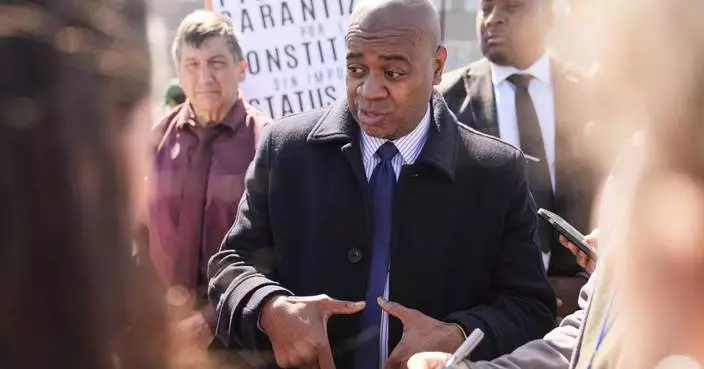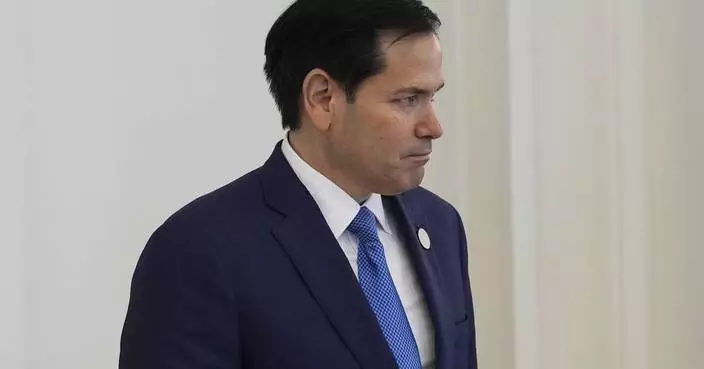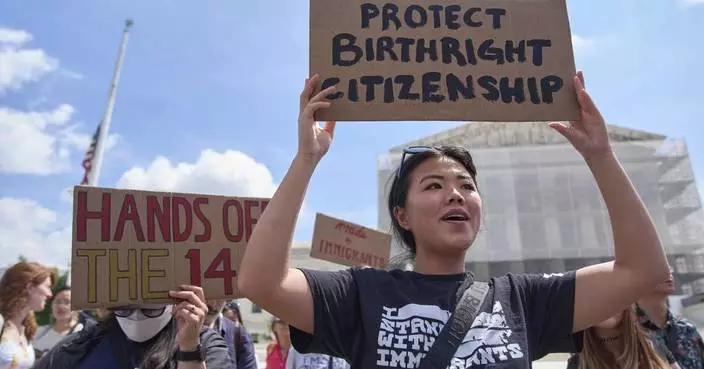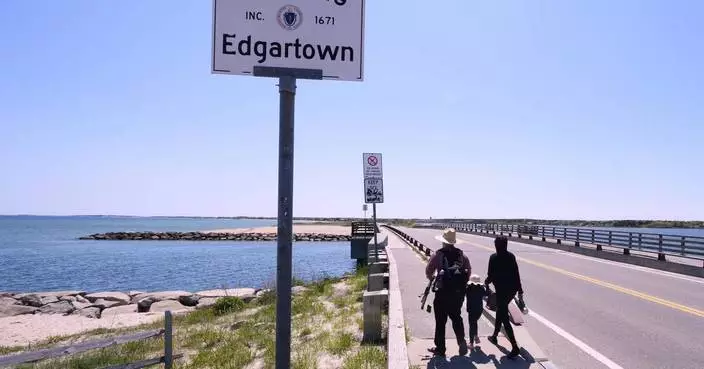ORLANDO, Fla. (AP) — Panama advanced to the Copa America quarterfinals for the first time, beating Bolivia 3-1 on Monday night to finish second in Group C.
Panama will play the Group D winner in the quarterfinals, most likely Brazil or Colombia.
Click to Gallery
Referees Mary Blanco from Colombia, Edina Alves Batista, second from left, Raphael Claus and Neuza Bak from Brazil walk off the field at half time during a Copa America Group C soccer match in Orlando, Fla., Monday, July 1, 2024. (AP Photo/John Raoux)
Bolivia's Bruno Miranda celebrates scoring his side's first goal against Panama during a Copa America Group C soccer match in Orlando, Fla., Monday, July 1, 2024. (AP Photo/John Raoux)
Bolivia's Hector Cuellar, top, heads the ball past Panama's Eric Davis during a Copa America Group C soccer match in Orlando, Fla., Monday, July 1, 2024. (AP Photo/John Raoux)
Panama's Eduardo Guerrero, second from right, is congratulated after scoring his side's 2nd goal against Bolivia during a Copa America Group C soccer match in Orlando, Fla., Monday, July 1, 2024. (AP Photo/John Raoux)
Panama's Cesar Blackman, right, and Bolivia's Jose Sagredo go for the ball during a Copa America Group C soccer match in Orlando, Fla., Monday, July 1, 2024. (AP Photo/John Raoux)
Bolivia's Bruno Miranda, center, dribbles the ball to score his side's first goal against Panama during a Copa America Group C soccer match in Orlando, Fla., Monday, July 1, 2024. (AP Photo/John Raoux)
Panama's Eduardo Guerrero, center, tries controls the ball past Bolivia's Leonel Justiniano, left, and Fernando Saucedo during a Copa America Group C soccer match in Orlando, Fla., Monday, July 1, 2024. (AP Photo/John Raoux)
Panama's players celebrate their team victory 3-1 over Bolivia at the end of a Copa America Group C soccer match in Orlando, Fla., Monday, July 1, 2024. (AP Photo/John Raoux)
Panama's Eric Davis, front, and Jose Cordoba celebrate their team victory 3-1 over Bolivia at the end of a Copa America Group C soccer match in Orlando, Fla., Monday, July 1, 2024. (AP Photo/John Raoux)
Panama's Cesar Blackman, top, is tackled by Bolivia's Jose Sagredo during a Copa America Group C soccer match in Orlando, Fla., Monday, July 1, 2024. (AP Photo/John Raoux)
Panama's coach Thomas Christansen reacts during a Copa America Group C soccer match against Bolivia, in Orlando, Fla., Monday, July 1, 2024. (AP Photo/John Raoux)
Bolivia's coach Antonio Carlos Zago, left, gives instructions to Marcelo Suarez during a Copa America Group C soccer match against Panama, in Orlando, Fla., Monday, July 1, 2024. (AP Photo/John Raoux)
Panama's Jose Fajardo, right, celebrates scoring his side's opening goal against Bolivia during a Copa America Group C soccer match in Orlando, Fla., Monday, July 1, 2024. (AP Photo/John Raoux)
Bolivia's Boris Cespedes, center, and Panama's Cesar Blackman compete for the ball during a Copa America Group C soccer match in Orlando, Fla., Monday, July 1, 2024. (AP Photo/John Raoux)
Panama's Jose Cordoba, left, and Bolivia's Carmelo Algaranaz jump for a header during a Copa America Group C soccer match in Orlando, Fla., Monday, July 1, 2024. (AP Photo/John Raoux)
Panama's Edgar Barcenas, center, dribbles the ball past Bolivia's Miguel Terceros, left, during a Copa America Group C soccer match in Orlando, Fla., Monday, July 1, 2024. (AP Photo/John Raoux)
Panama's Jose Fajardo celebrates scoring his side's opening goal against Bolivia during a Copa America Group C soccer match in Orlando, Fla., Monday, July 1, 2024. (AP Photo/John Raoux)
Panama's Jose Fajardo is congratulated after scoring his side's opening goal against Bolivia during a Copa America Group C soccer match in Orlando, Fla., Monday, July 1, 2024. (AP Photo/John Raoux)
José Fajardo scored in his second straight game, putting Panama ahead in the 22nd minute.
Bruno Miranda tied the score in the 69th minute, a goal that temporarily dropped Panama behind the United States into third place.
Eduardo Guerrero gave Panama a 2-1 lead in the 79th, pushing his team back into position to advance, and César Yanis added a goal in the first minute of stoppage time.
Panama, under Danish coach Thomas Christiansen, was in the Copa America for the second time.
Brazilian referee Edina Alves and assistants Neuza Back of Brazil and Mary Blanco of Colombia became the first all-female on-field officiating crew in the Copa America.
Fajardo scored when he settled a header from Christian Martínez near the penalty spot and volleyed it over goalkeeper Guillermo Viscarra for his 12th international goal.
Miranda scored Bolivia’s first goal of the tournament when he settled a pass from Ramiro Vaca with his right foot and slid a shot by goalkeeper Orlando Mosquera inside the near post.
Guerrero scored with a diving header in the 79th off Éric Davis’ cross and Yanis scored seconds after entering as a substitute, settling Guerrero's header and launching a shot into the upper corner.
Panama was without Adalberto Carrasquilla, who got a red card for a reckless foul on Christian Pulisic toward the end of its win last week.
AP Copa America coverage: https://apnews.com/hub/copa-america
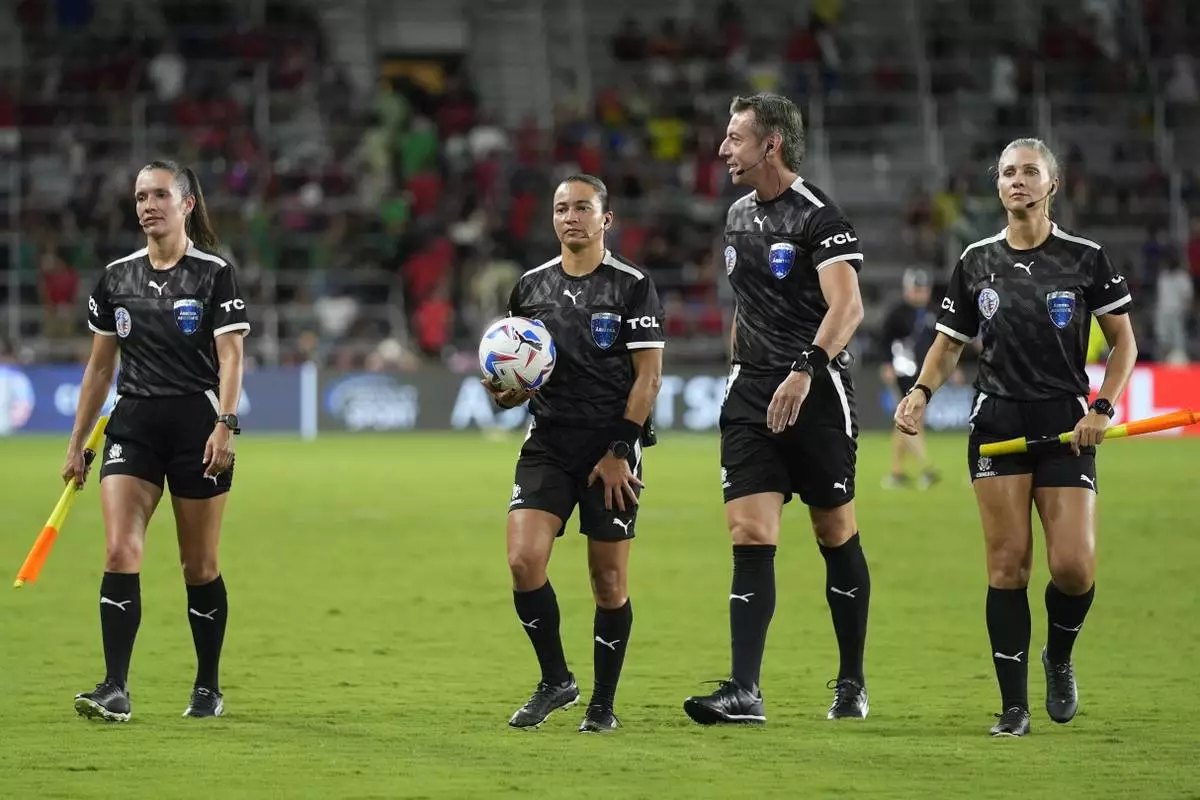
Referees Mary Blanco from Colombia, Edina Alves Batista, second from left, Raphael Claus and Neuza Bak from Brazil walk off the field at half time during a Copa America Group C soccer match in Orlando, Fla., Monday, July 1, 2024. (AP Photo/John Raoux)
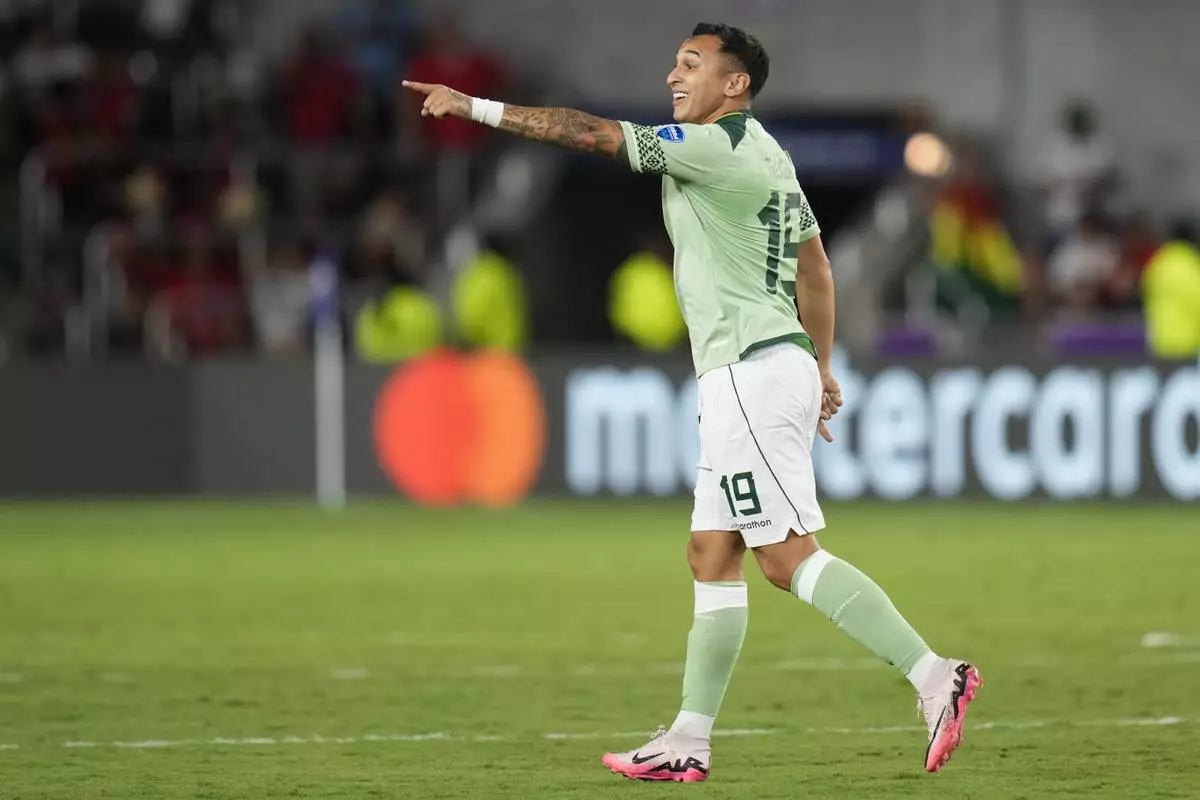
Bolivia's Bruno Miranda celebrates scoring his side's first goal against Panama during a Copa America Group C soccer match in Orlando, Fla., Monday, July 1, 2024. (AP Photo/John Raoux)
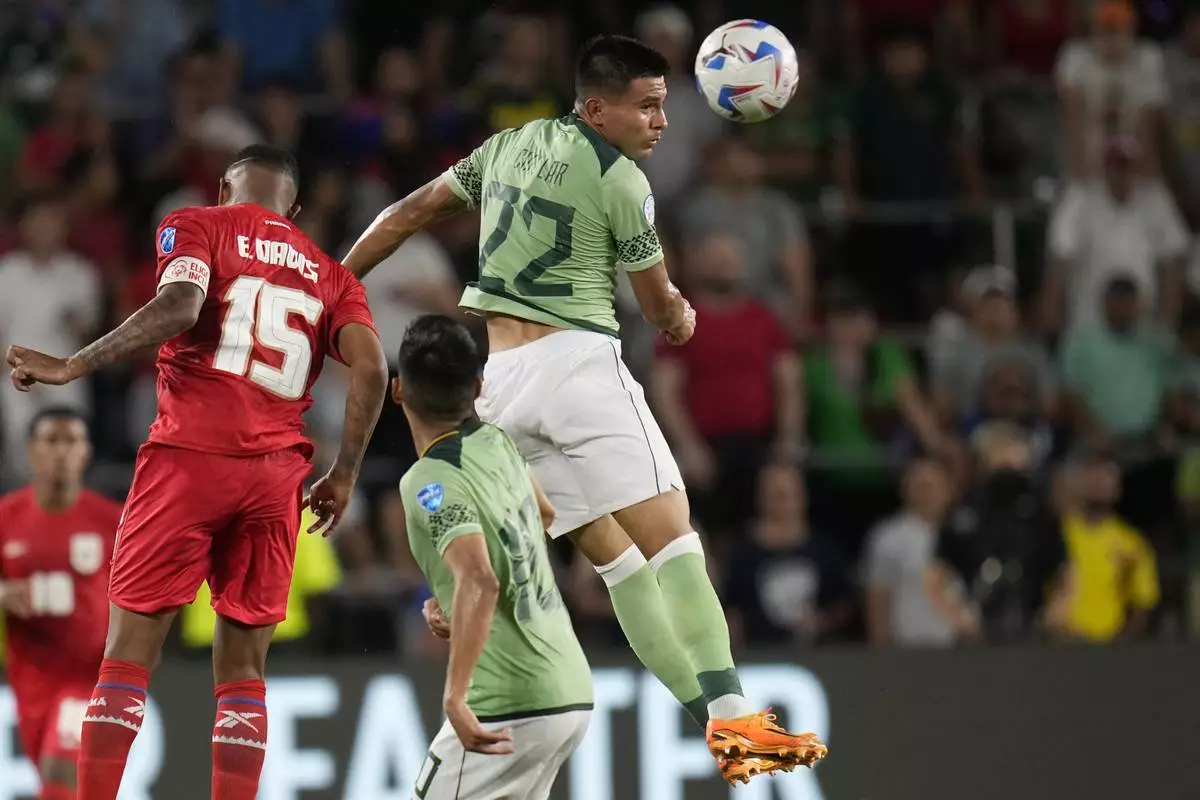
Bolivia's Hector Cuellar, top, heads the ball past Panama's Eric Davis during a Copa America Group C soccer match in Orlando, Fla., Monday, July 1, 2024. (AP Photo/John Raoux)
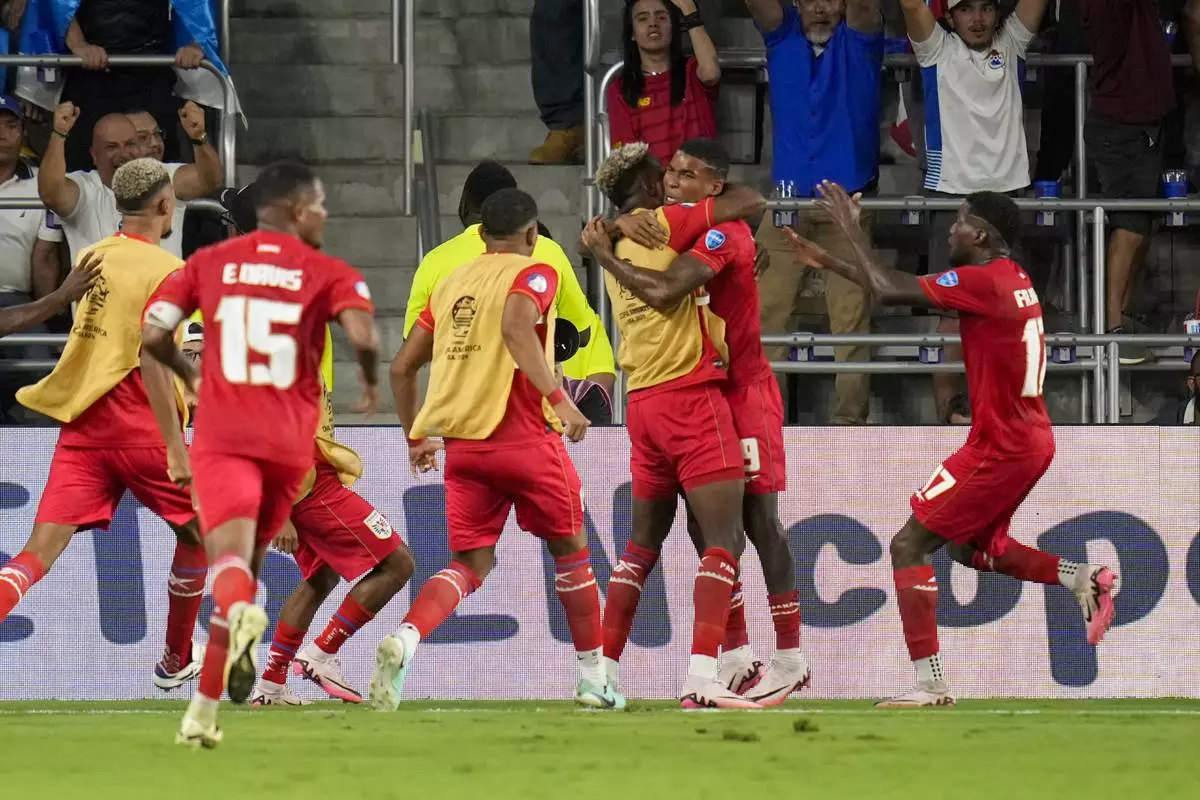
Panama's Eduardo Guerrero, second from right, is congratulated after scoring his side's 2nd goal against Bolivia during a Copa America Group C soccer match in Orlando, Fla., Monday, July 1, 2024. (AP Photo/John Raoux)
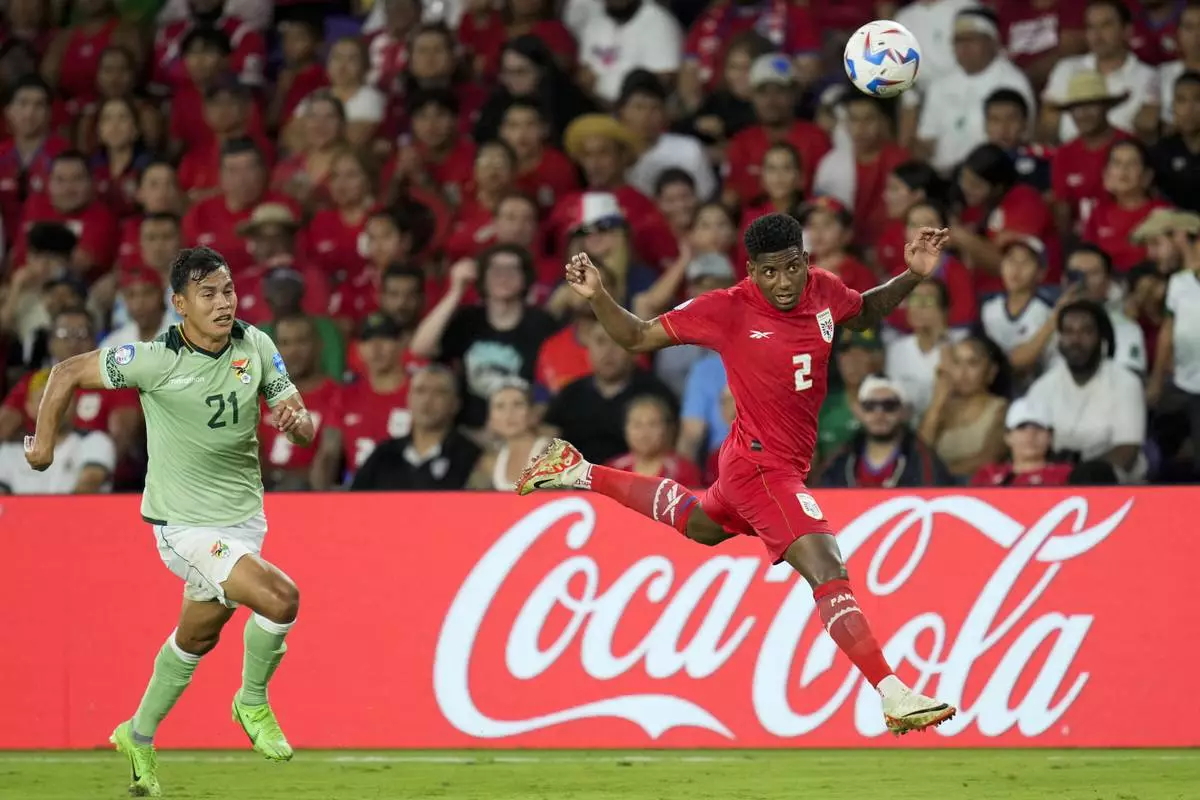
Panama's Cesar Blackman, right, and Bolivia's Jose Sagredo go for the ball during a Copa America Group C soccer match in Orlando, Fla., Monday, July 1, 2024. (AP Photo/John Raoux)
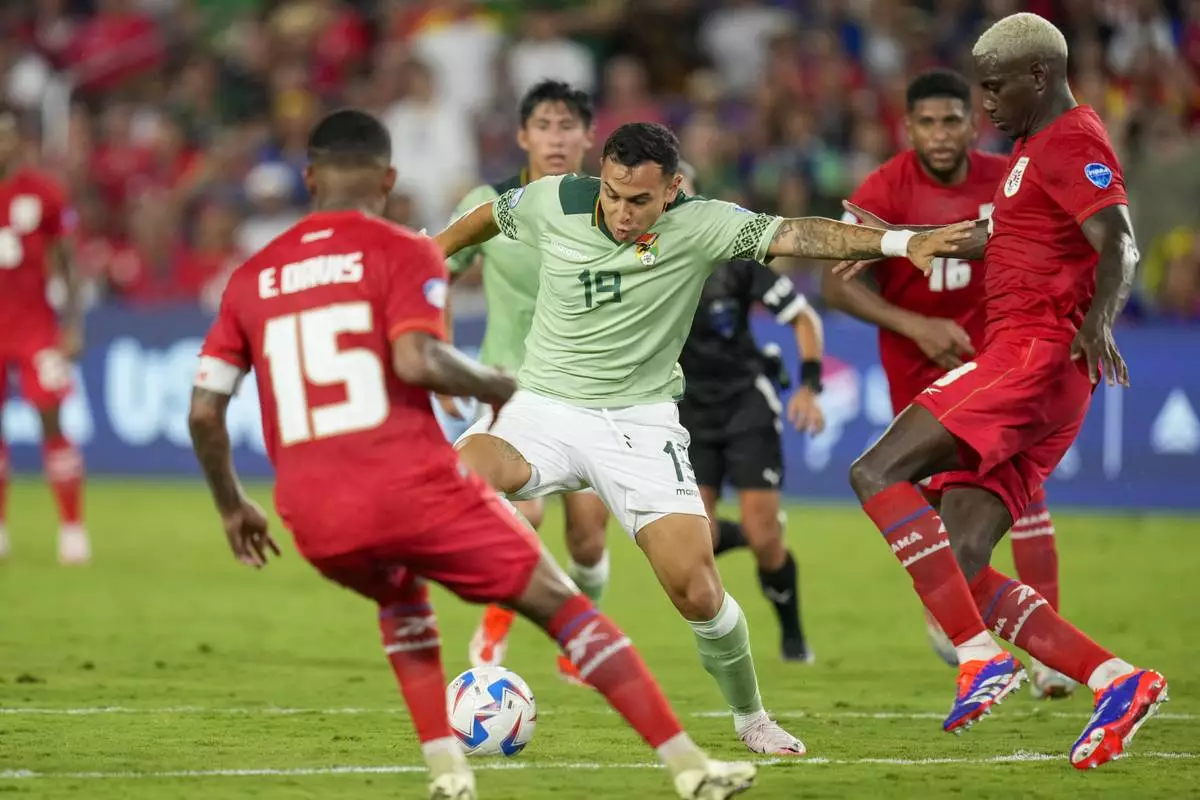
Bolivia's Bruno Miranda, center, dribbles the ball to score his side's first goal against Panama during a Copa America Group C soccer match in Orlando, Fla., Monday, July 1, 2024. (AP Photo/John Raoux)
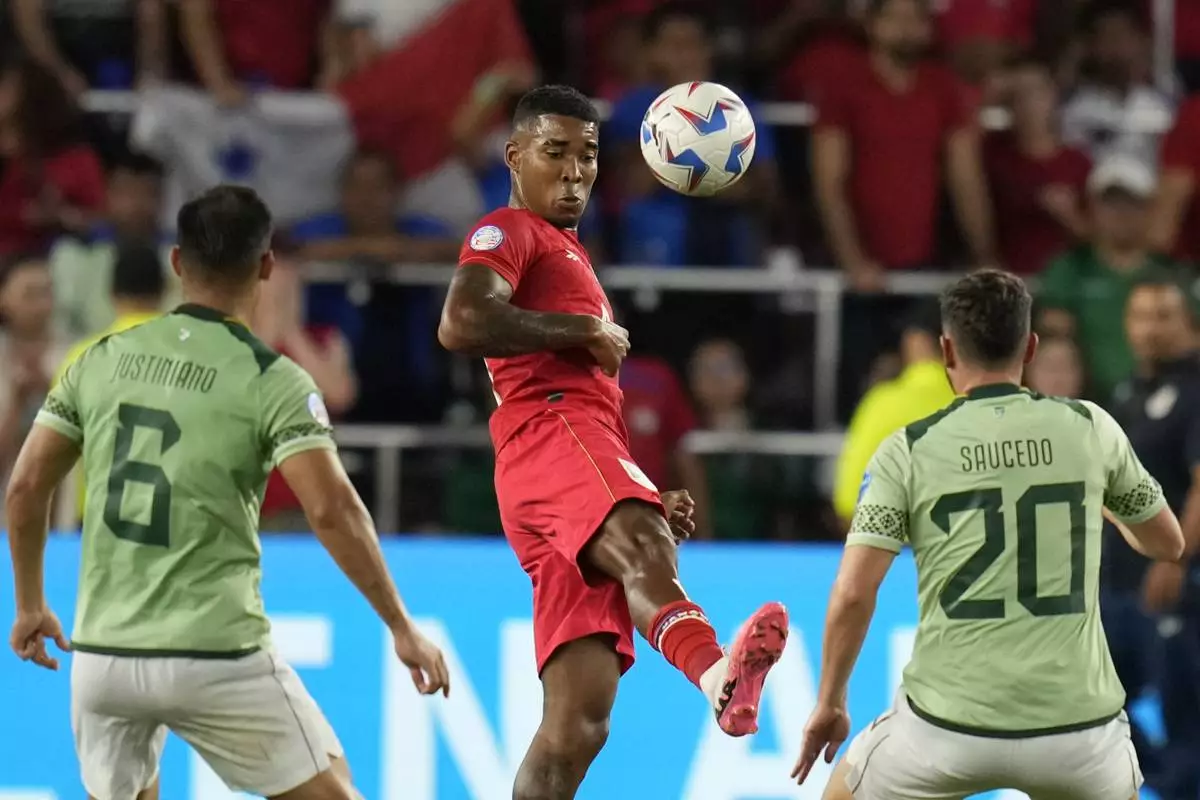
Panama's Eduardo Guerrero, center, tries controls the ball past Bolivia's Leonel Justiniano, left, and Fernando Saucedo during a Copa America Group C soccer match in Orlando, Fla., Monday, July 1, 2024. (AP Photo/John Raoux)
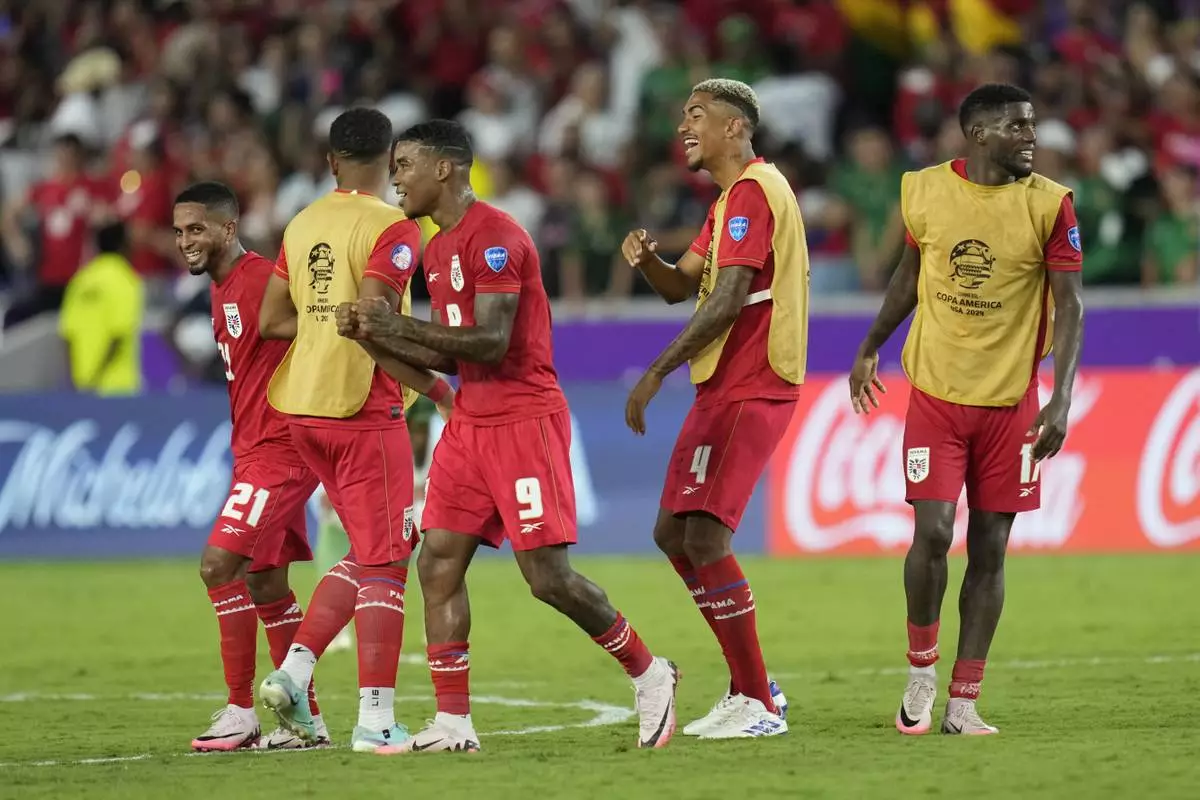
Panama's players celebrate their team victory 3-1 over Bolivia at the end of a Copa America Group C soccer match in Orlando, Fla., Monday, July 1, 2024. (AP Photo/John Raoux)
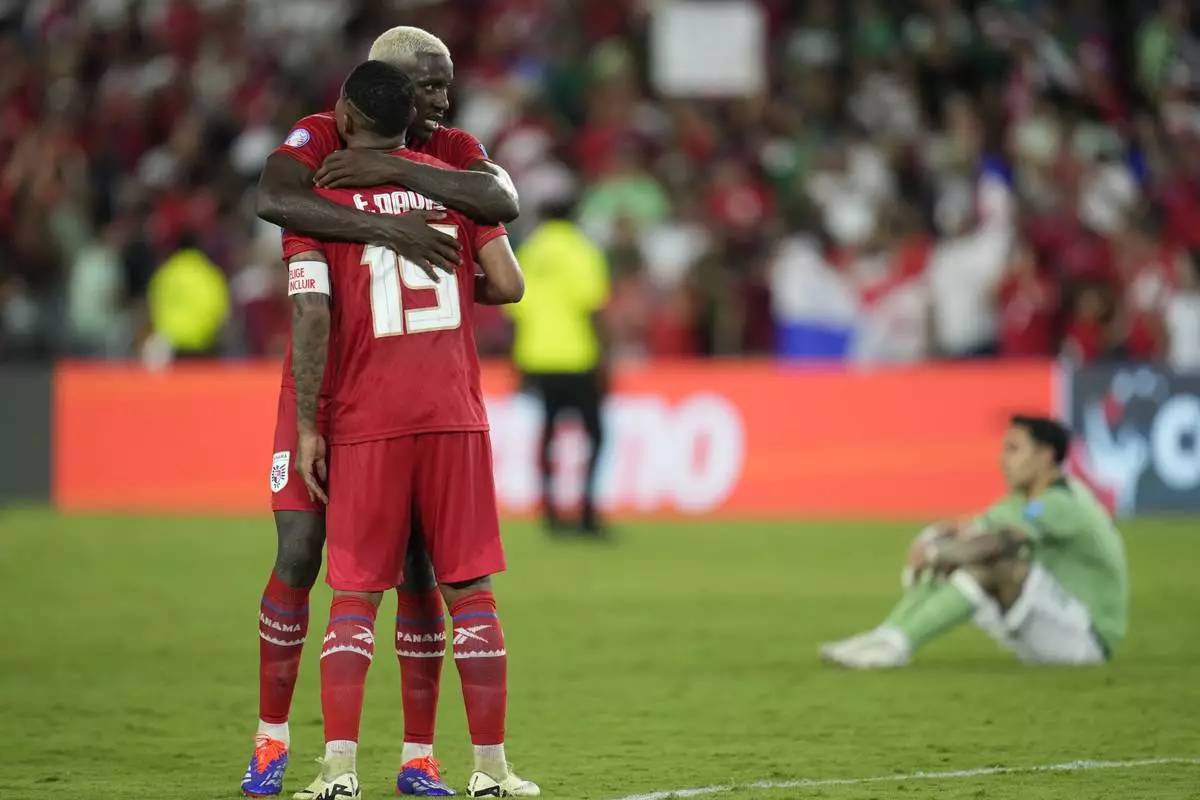
Panama's Eric Davis, front, and Jose Cordoba celebrate their team victory 3-1 over Bolivia at the end of a Copa America Group C soccer match in Orlando, Fla., Monday, July 1, 2024. (AP Photo/John Raoux)
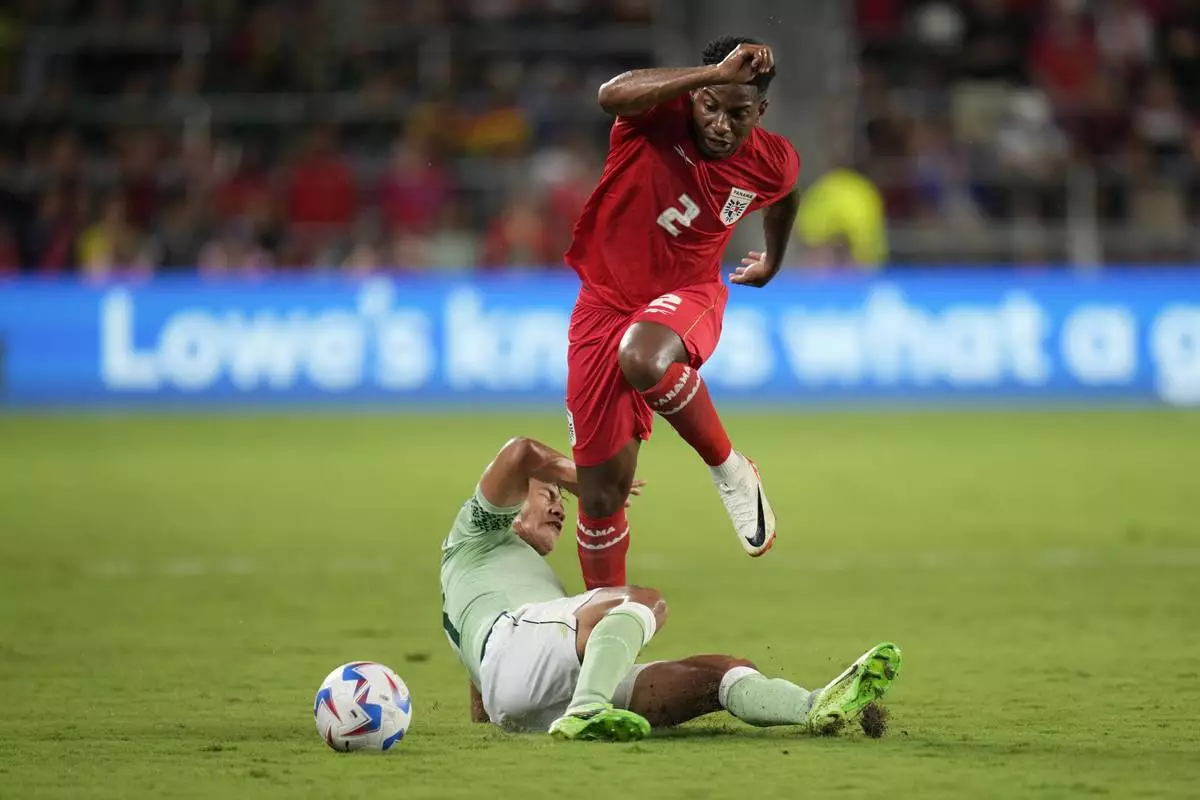
Panama's Cesar Blackman, top, is tackled by Bolivia's Jose Sagredo during a Copa America Group C soccer match in Orlando, Fla., Monday, July 1, 2024. (AP Photo/John Raoux)

Panama's coach Thomas Christansen reacts during a Copa America Group C soccer match against Bolivia, in Orlando, Fla., Monday, July 1, 2024. (AP Photo/John Raoux)
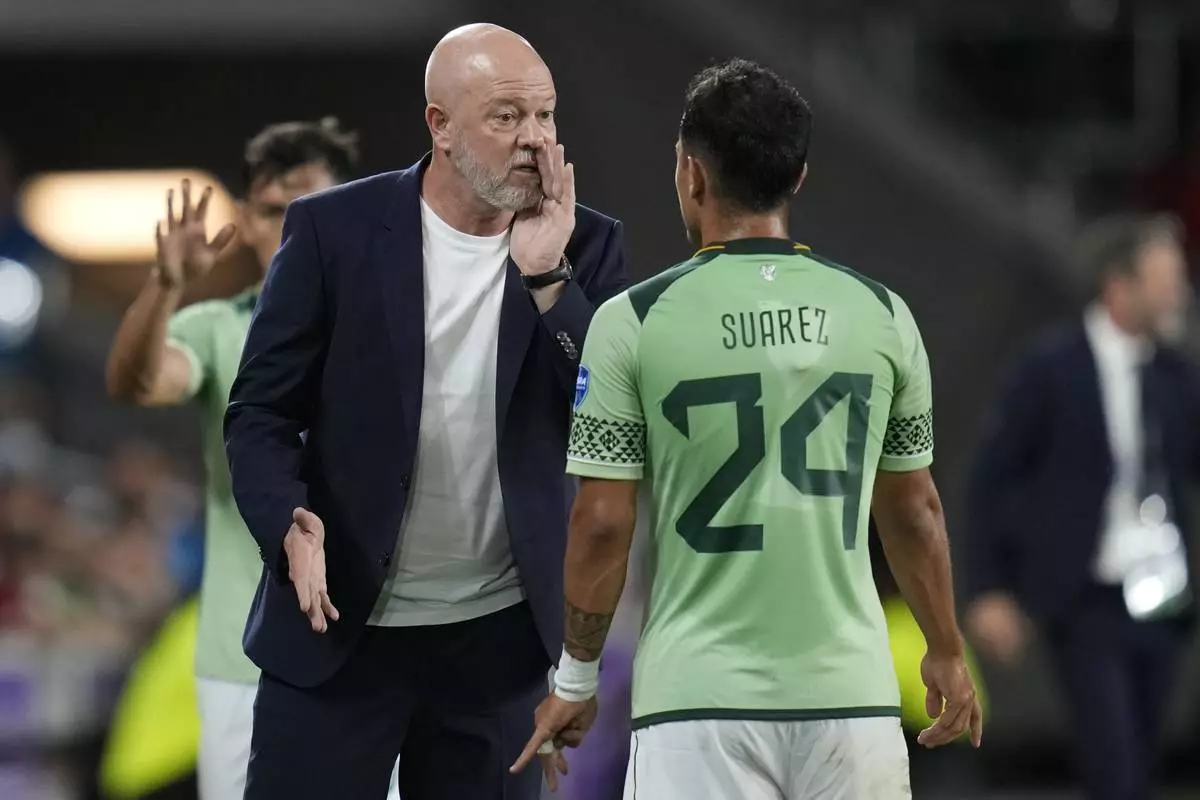
Bolivia's coach Antonio Carlos Zago, left, gives instructions to Marcelo Suarez during a Copa America Group C soccer match against Panama, in Orlando, Fla., Monday, July 1, 2024. (AP Photo/John Raoux)
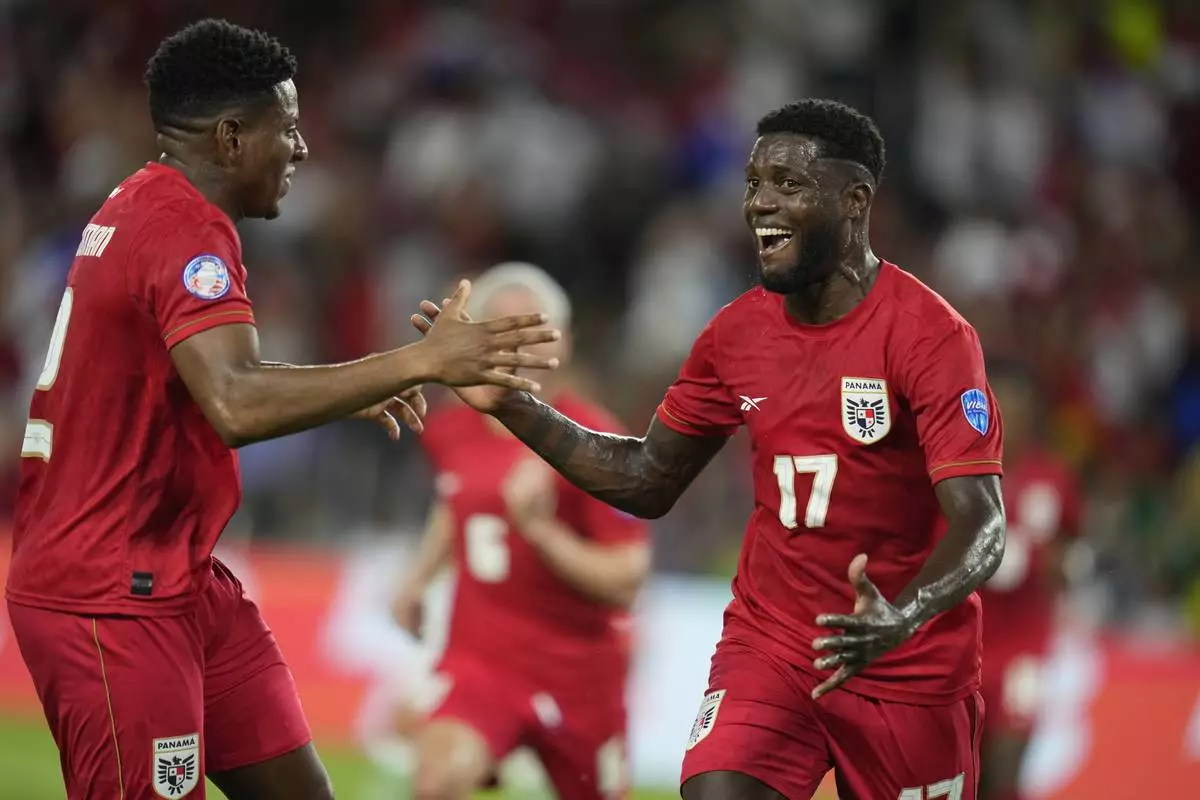
Panama's Jose Fajardo, right, celebrates scoring his side's opening goal against Bolivia during a Copa America Group C soccer match in Orlando, Fla., Monday, July 1, 2024. (AP Photo/John Raoux)
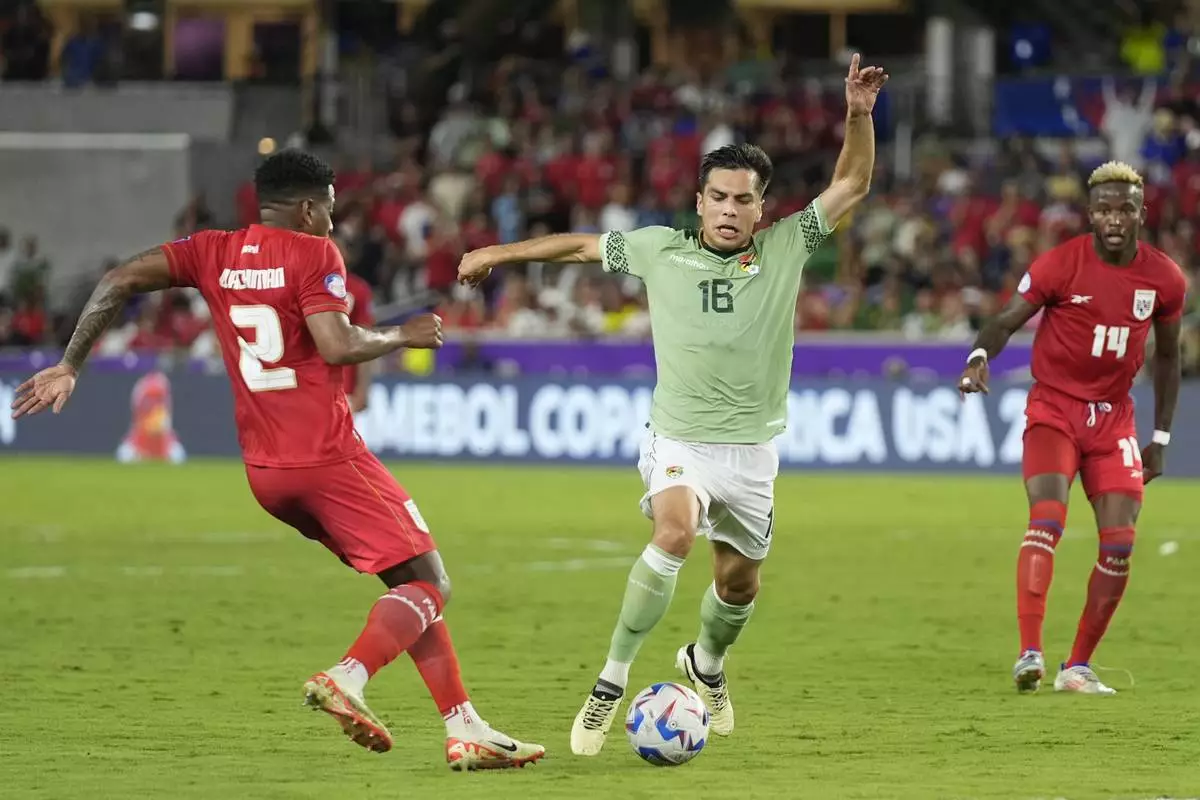
Bolivia's Boris Cespedes, center, and Panama's Cesar Blackman compete for the ball during a Copa America Group C soccer match in Orlando, Fla., Monday, July 1, 2024. (AP Photo/John Raoux)
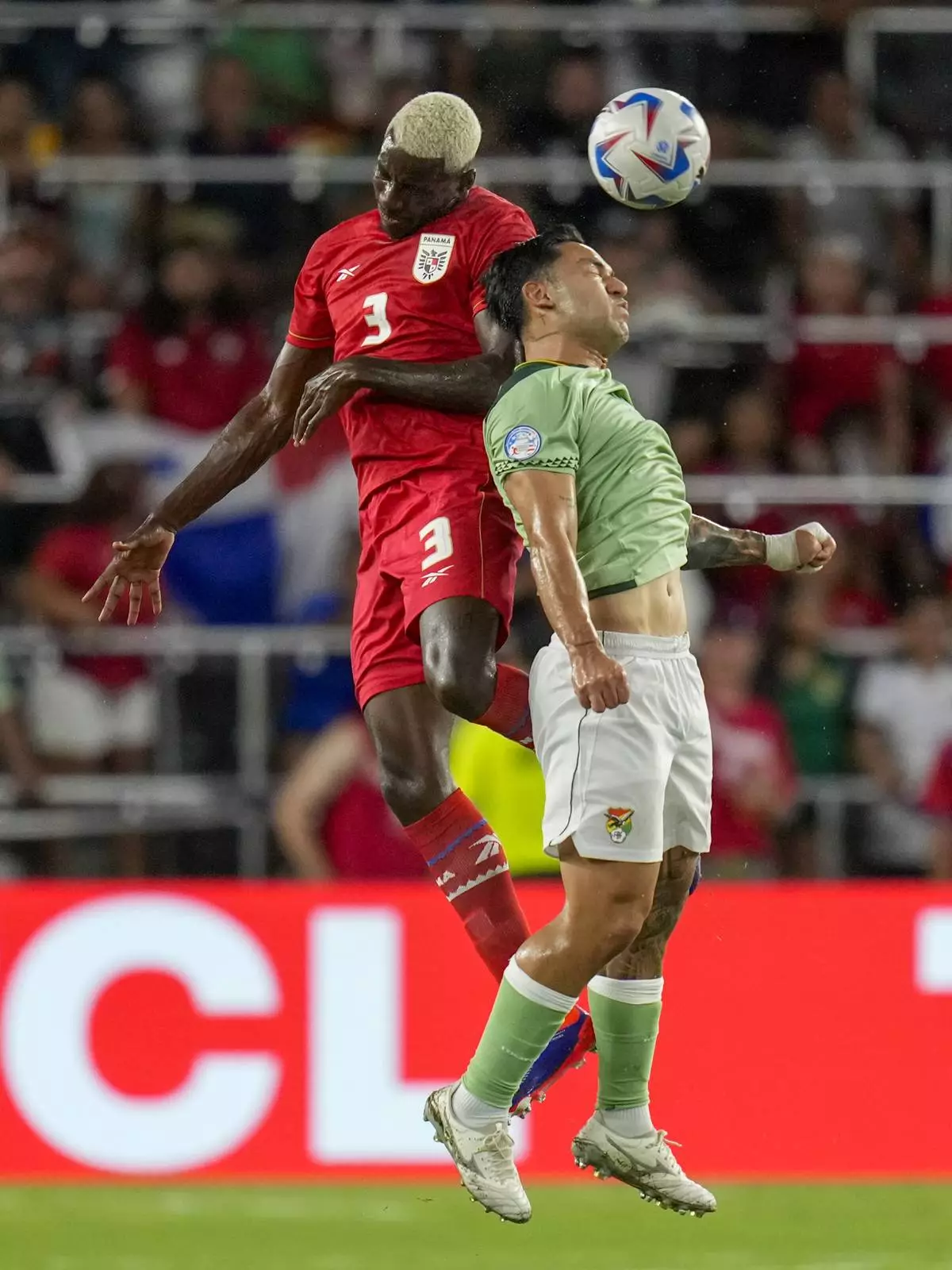
Panama's Jose Cordoba, left, and Bolivia's Carmelo Algaranaz jump for a header during a Copa America Group C soccer match in Orlando, Fla., Monday, July 1, 2024. (AP Photo/John Raoux)
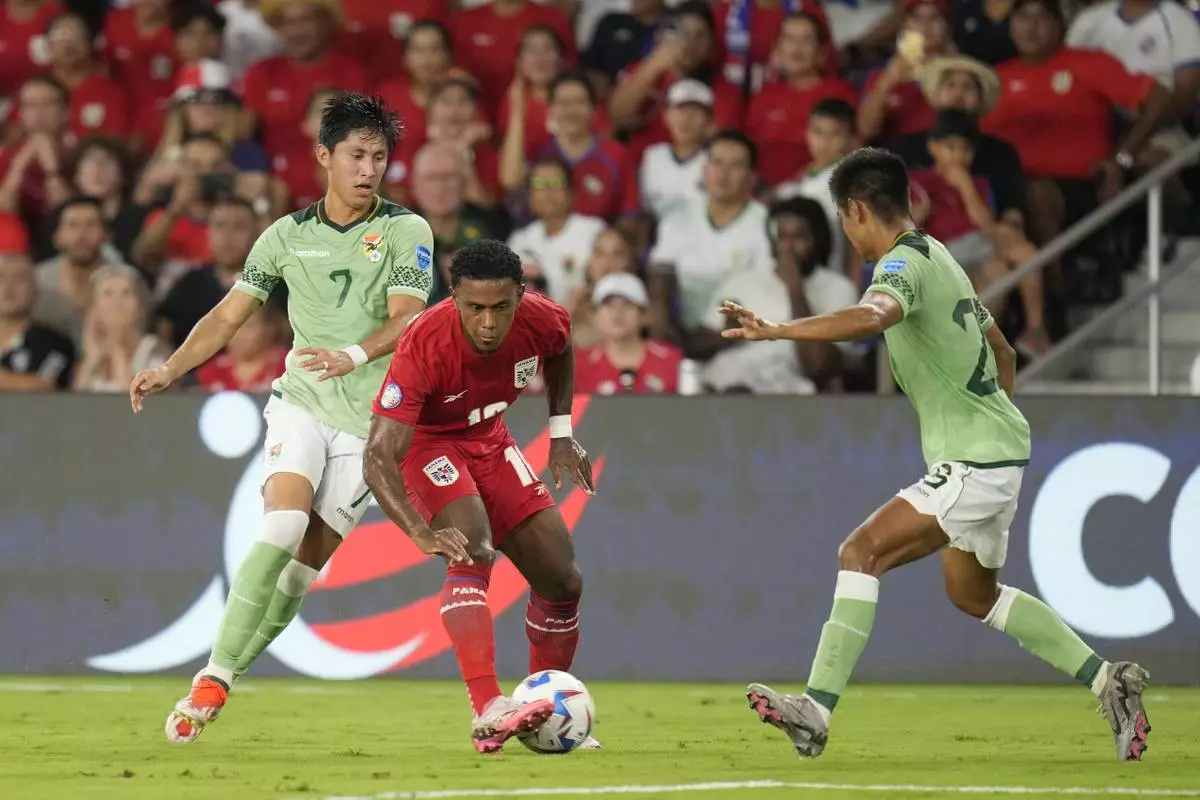
Panama's Edgar Barcenas, center, dribbles the ball past Bolivia's Miguel Terceros, left, during a Copa America Group C soccer match in Orlando, Fla., Monday, July 1, 2024. (AP Photo/John Raoux)
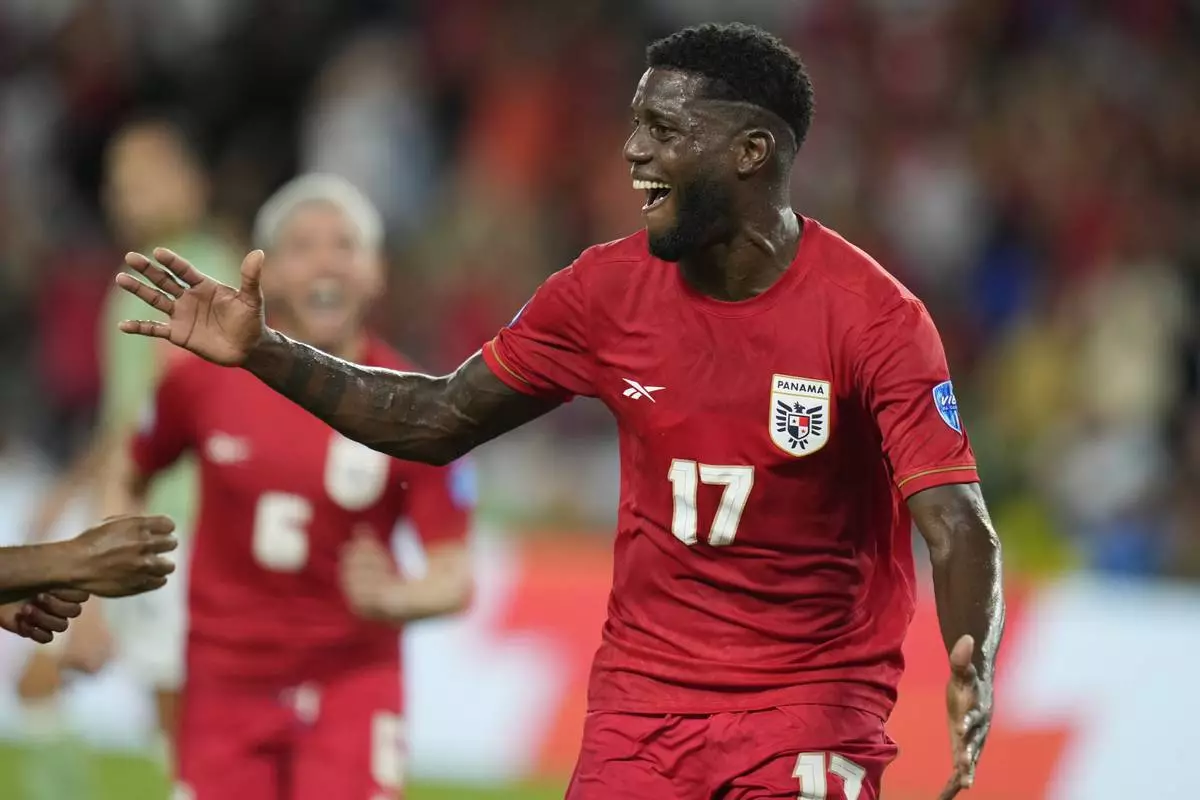
Panama's Jose Fajardo celebrates scoring his side's opening goal against Bolivia during a Copa America Group C soccer match in Orlando, Fla., Monday, July 1, 2024. (AP Photo/John Raoux)

Panama's Jose Fajardo is congratulated after scoring his side's opening goal against Bolivia during a Copa America Group C soccer match in Orlando, Fla., Monday, July 1, 2024. (AP Photo/John Raoux)
WASHINGTON (AP) — The Supreme Court on Thursday weighed whether to allow President Donald Trump’s restrictions on birthright citizenship to temporarily take effect in most of the country, even if they might ultimately be found to violate the Constitution.
The justices heard arguments in the Trump administration's emergency appeals over lower court orders that have kept the citizenship restrictions on hold across the country. Nationwide, or universal, injunctions have emerged as an important check on Trump's efforts to remake the government and a mounting frustration to the Republican president and his allies.
Judges have issued 40 nationwide injunctions since Trump began his second term in January, Solicitor General D. John Sauer told the court at the start of more than two hours of arguments.
Birthright citizenship is among several issues, many related to immigration, that the administration has asked the court to address on an emergency basis, after lower courts acted to slow the president’s agenda.
The justices are also considering the Trump administration’s pleas to end humanitarian parole for more than 500,000 people from Cuba, Haiti, Nicaragua and Venezuela and to strip other temporary legal protections from another 350,000 Venezuelans. The administration remains locked in legal battles over its efforts to swiftly deport people accused of being gang members to a prison in El Salvador under an 18th century wartime law called the Alien Enemies Act.
Trump signed an executive order on the first day of his second term that would deny citizenship to children who are born to people who are in the country illegally or temporarily.
The order conflicts with a Supreme Court decision from 1898 that held that the Citizenship Clause of the 14th Amendment made citizens of all children born on U.S. with narrow exceptions that are not at issue in this case.
States, immigrants and rights group sued almost immediately, and lower courts quickly barred enforcement of the order while the lawsuits proceed.
The current fight is over the rules that apply while the lawsuits go forward.
The court's liberal justices seemed firmly in support of the lower court rulings that found the changes to citizenship that Trump wants to make would upset the settled understanding of birthright citizenship that has existed for more than 125 years.
Birthright citizenship is an odd case to use to scale back nationwide injunctions, Justice Elena Kagan said. "Every court has ruled against you,” she told Sauer.
But if the government wins on today’s arguments, it could still enforce the order against people who haven’t sued, Kagan said. “All of those individuals are going to win. And the ones who can’t afford to go to court, they’re the ones who are going to lose,” she said
Several conservative justices who might be open to limiting nationwide injunctions also wanted to know the practical effects of such a decision as well as how quickly the court could reach a final decision on the Trump executive order.
Justice Brett Kavanaugh pressed Sauer with a series of questions about how the federal government might enforce Trump’s order.
“What do hospitals do with a newborn? What do states do with a newborn?” he said.
Sauer said they wouldn’t necessarily do anything different, but the government might figure out ways to reject documentation with “the wrong designation of citizenship.”
Kavanaugh continued to press for clearer answers, pointing out that the executive order only gave the government about 30 days to develop a policy. “You think they can get it together in time?” he said.
The Trump administration, like the Biden administration before it, has complained that judges are overreaching by issuing orders that apply to everyone instead of just the parties before the court.
Justice Sonia Sotomayor was among several justices who raised the confusing patchwork of rules that would result if the court orders were narrowed and new restrictions on citizenship could temporarily take effect in 27 states.
Some children might be “stateless,” Sotomayor said, because they'd be denied citizenship in the U.S. as well as the countries their parents fled to avoid persecution.
New Jersey Solicitor General Jeremy Feigenbaum, representing 22 states that sued, said citizenship could “turn on and off” for children crossing the Delaware River between Camden, New Jersey, where affected children would be citizens, and Philadelphia, where they wouldn't be. Pennsylvania is not part of the lawsuit.
One possible solution for the court might be to find a way to replace nationwide injunctions with certification of a class action, a lawsuit in which individuals serve as representatives of a much larger group of similarly situated people.
Such a case could be filed and acted upon quickly and might even apply nationwide.
But under questioning from Justice Amy Coney Barrett and others, Sauer said the Trump administration could well oppose such a lawsuit or potentially try to slow down class actions.
Supreme Court arguments over emergency appeals are rare. The justices almost always deal with the underlying substance of a dispute.
But the administration didn't ask the court to take on the larger issue now and, if the court sides with the administration over nationwide injunctions, it's unclear how long inconsistent rules on citizenship would apply to children born in the United States.
A decision is expected by the end of June.
Follow the AP's coverage of the U.S. Supreme Court at https://apnews.com/hub/us-supreme-court.
![Tanjam Jacobson, of Silver Spring, Md., holds a sign saying "Citizenship is a Birthright," Thursday, May 15, 2025, outside the Supreme Court in Washington. Jacobson is a naturalized U.S. citizen who was born in England of Indian descent, and her son was born here. "This is something that really matters," says Jacobson, "it's so wrong against the constitution [to take away birthright citizenship]." (AP Photo/Jacquelyn Martin)](https://image.bastillepost.com/1200x/wp-content/uploads/global/2025/05/2c495cddc1436e21a9fa976d295dc292_Supreme_Court_Birthright_Citizenship_26310.jpg.webp)
Tanjam Jacobson, of Silver Spring, Md., holds a sign saying "Citizenship is a Birthright," Thursday, May 15, 2025, outside the Supreme Court in Washington. Jacobson is a naturalized U.S. citizen who was born in England of Indian descent, and her son was born here. "This is something that really matters," says Jacobson, "it's so wrong against the constitution [to take away birthright citizenship]." (AP Photo/Jacquelyn Martin)
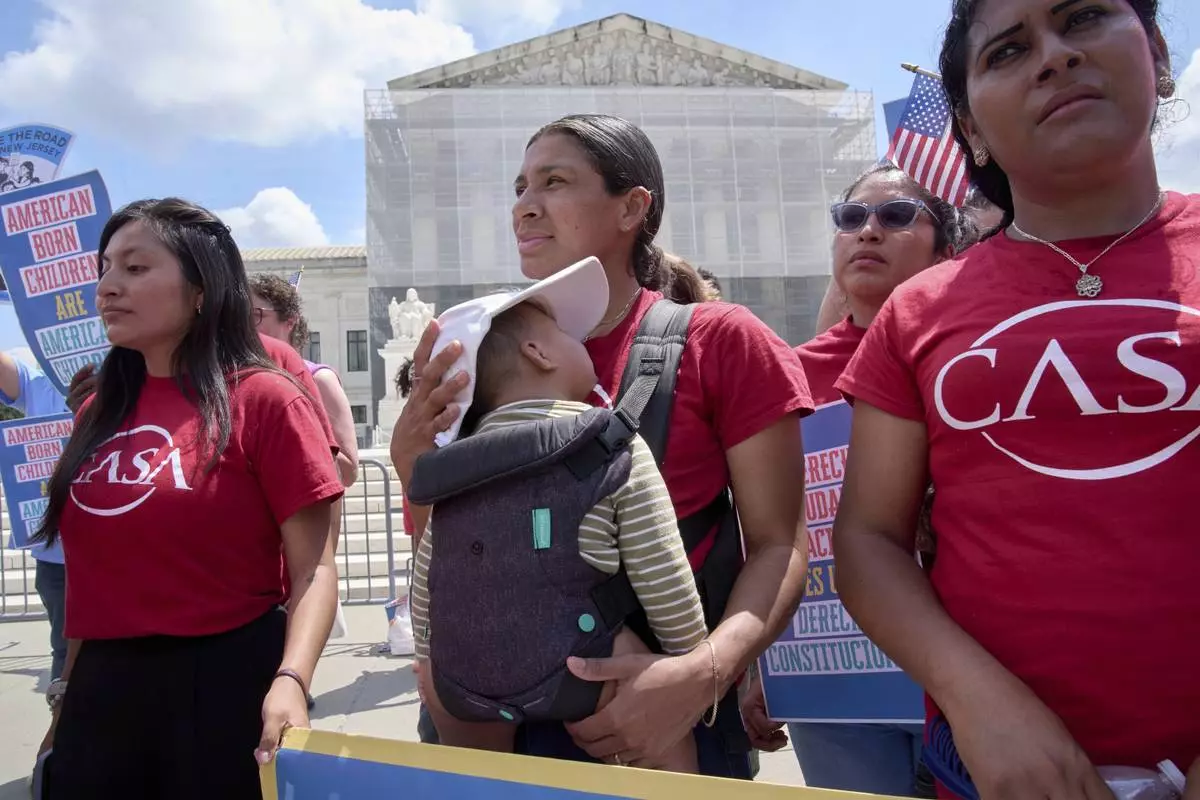
A woman from CASA Maryland holds her 9-month-old baby as she joins others in support of birthright citizenship, Thursday, May 15, 2025, outside of the Supreme Court in Washington. (AP Photo/Jacquelyn Martin)







































![Tanjam Jacobson, of Silver Spring, Md., holds a sign saying "Citizenship is a Birthright," Thursday, May 15, 2025, outside the Supreme Court in Washington. Jacobson is a naturalized U.S. citizen who was born in England of Indian descent, and her son was born here. "This is something that really matters," says Jacobson, "it's so wrong against the constitution [to take away birthright citizenship]." (AP Photo/Jacquelyn Martin)](https://image.bastillepost.com/1200x/wp-content/uploads/global/2025/05/2c495cddc1436e21a9fa976d295dc292_Supreme_Court_Birthright_Citizenship_26310.jpg.webp)


